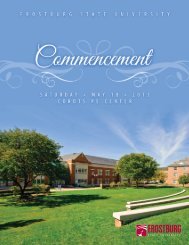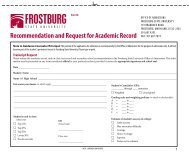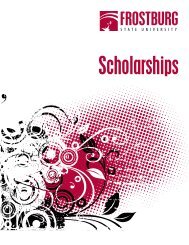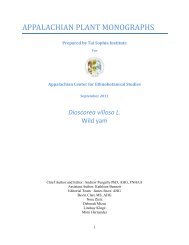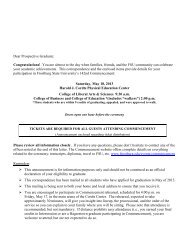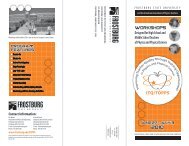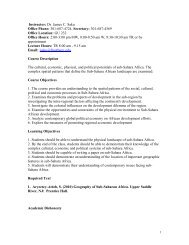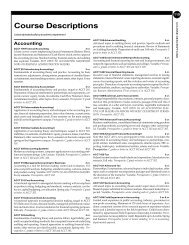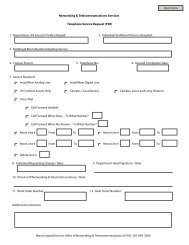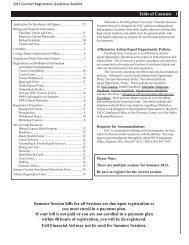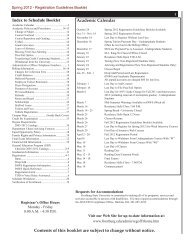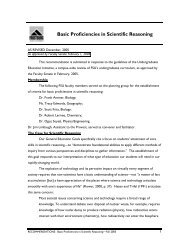Artful Aspirations, Cool Careers - Frostburg State University
Artful Aspirations, Cool Careers - Frostburg State University
Artful Aspirations, Cool Careers - Frostburg State University
Create successful ePaper yourself
Turn your PDF publications into a flip-book with our unique Google optimized e-Paper software.
FSU Staying Ahead of the Technology Curve<br />
Advances Continue Momentum Begun with Construction of Science Center<br />
With the opening of the Compton Science Center<br />
in 2003, <strong>Frostburg</strong> <strong>State</strong> <strong>University</strong> made a giant<br />
leap forward in science and technology, and that<br />
momentum continues today as FSU keeps updating<br />
its labs and adding programs to meet the needs of<br />
a changing workforce. Here are some of the latest<br />
developments:<br />
B.S. in Information Technology<br />
<strong>Frostburg</strong> has been granted final approval to offer<br />
a bachelor of science degree in information technology<br />
through FSU’s Department of Computer<br />
Science. A minor in information technology will<br />
also be offered.<br />
Information technology differs from computer<br />
science in its focus. Computer science tends to be<br />
directed more purely on the design of a program,<br />
while information technology tends to be more<br />
of the bridge to the program’s user.<br />
These external skills that are needed are the<br />
purpose for the program’s tracks of accounting,<br />
business, computer security, graphic arts and mass<br />
communication. These are often technologyintensive<br />
disciplines that also require specialized<br />
knowledge in the field beyond the computer<br />
program itself.<br />
Business leaders in particular have expressed<br />
interest in hiring graduates in information technology,<br />
and it was their input that led to the<br />
flexible approach to the program.<br />
“Information technology is projected to be one<br />
of the top 10 areas of employment growth in the<br />
state of Maryland,” said Dr. Brad Rinard, chair of<br />
FSU’s Department of Computer Science.<br />
The program is designed to meet the standards<br />
of the Accreditation Board for Engineering and<br />
Technology, and the <strong>University</strong> will be pursuing<br />
accreditation from that board.<br />
B.S. in Engineering<br />
The Maryland Higher Education Commission<br />
this spring approved FSU’s proposal to offer<br />
a Bachelor of Science in Engineering degree,<br />
with the first students eligible to enroll in the<br />
fall of 2008.<br />
The new program will allow students to pursue<br />
concentrations in electrical engineering,<br />
materials engineering, industrial chemistry and<br />
engineering management. <strong>University</strong> officials<br />
expect prospective students to be attracted to<br />
the added flexibility of the program, which also<br />
makes it possible to pursue second majors or<br />
minors in disciplines such as physics, mathematics,<br />
chemistry or business.<br />
“The graduates of the new B.S. in Engineering<br />
program will find employment in a broad range<br />
of jobs that require general knowledge of engineering<br />
to work in multidisciplinary teams such<br />
as project management, customer service, sales,<br />
quality assurance, legal services and consulting,”<br />
said Dr. Oguz Soysal, former chair of the<br />
department who coordinated the new program’s<br />
route to approval. “The flexibility of the program<br />
will be particularly attractive for non-traditional<br />
students who wish to continue their education<br />
in engineering.”<br />
This is FSU’s first stand-alone engineering<br />
degree; FSU has offered engineering in collaboration<br />
with the <strong>University</strong> of Maryland since<br />
the 1970s.<br />
The program was designed by examining<br />
a wide variety of existing general engineering<br />
programs and in consultation with industry<br />
leaders to ensure “best practices” as identified<br />
by industry.<br />
Collaboration with the <strong>University</strong> of Maryland<br />
has been the basis for all past FSU engineering<br />
offerings. The new program will be in addition<br />
to dual-degree and collaborative engineering<br />
programs already offered.<br />
FSU’s new program has been designed to meet<br />
the standards of the Accreditation Board for<br />
Engineering and Technology Education (ABET),<br />
which has previously accredited the FSU/U.Md.<br />
collaborative programs.<br />
Coal & Shale Analysis Laboratory<br />
FSU has been awarded $100,000 from the<br />
Appalachian Regional Commission to establish<br />
the FSU Coal and Shale Analysis Laboratory<br />
to provide chemical analysis of coal and shale<br />
reserves in Western Maryland.<br />
ARC funds will be used to purchase the equipment<br />
for chemical analysis to determine the<br />
quality of coal and shale in Western Maryland<br />
reserves, catalog this information using spatial<br />
mapping technology, and provide it in a format<br />
“The flexibility of the[new engineering]<br />
program will be particularly attractive<br />
for non-traditional students who wish to<br />
continue their education in engineering.”<br />
—Dr. Oguz Soysal<br />
accessible and useful to industry. The lab will allow<br />
FSU to partner with the state Department of<br />
Natural Resources, Western Maryland Resource<br />
Conservation and Development Council Inc.,<br />
the Maryland Bureau of Mines, and the U.S.<br />
Geographical Survey to develop the best method<br />
for collection, analysis, cataloging of information,<br />
and for the dissemination of information for easy<br />
access and future reference.<br />
A primary use of the laboratory will be for companies<br />
wanting to explore natural gas deposits in<br />
the Marcellus Shale, which lies more than a mile<br />
under the surface of the northern Appalachian<br />
Mountains, including Western Maryland. Until<br />
Pictured from left are Dr. Barry Phillips ’69 of Bayer MaterialScience, FSU President Jonathan Gibralter, FSU Foundation President<br />
Sam Griffith, Dean of the College of Liberal Arts and Sciences Joseph Hoffman, Associate Professor of Chemistry Robert Larivee<br />
and Vice President for <strong>University</strong> Advancement Bernard J. Davisson II, in front of the new sign in the Compton Science Center<br />
identifying the lab.<br />
recently, these resources were considered too<br />
difficult to tap. The lab may also be used to<br />
determine the potential of disposing of fly ash,<br />
a toxic byproduct of coal combustion, in abandoned<br />
coal mines, which could mitigate acid<br />
mine drainage.<br />
These funds came from a special ARC regional<br />
initiative that targets funds to encourage and<br />
support energy resources. In addition to ARC<br />
funds, the <strong>University</strong> will provide an additional<br />
$100,000, bringing the total project funding to<br />
$200,000.<br />
Nanotechnology Lab<br />
FSU was awarded $96,000 from the Appalachian<br />
Regional Commission to establish a nanotechnology<br />
laboratory, a technology that cuts across disciplines<br />
and can be used by students in engineering,<br />
physics, chemistry and biology programs<br />
The project will serve approximately 430 students<br />
each year after it is completed. It will<br />
integrate nanoscale science and engineering into<br />
the curriculum, and will also provide extracurricular<br />
enrichment for students from area schools<br />
and expertise to companies in the on-campus<br />
Allegany Business Center. Nanotechnology is<br />
used extensively in fields such as medicine, electronics<br />
and textiles.<br />
The facility will include a deposition system<br />
for novel nanostructured materials, a scanning<br />
probe microscope, and integration materials<br />
for chemical and biological sensor applications.<br />
In addition to ARC funds, FSU will provide<br />
$96,000, bringing the total project funding to<br />
$192,000.<br />
Bayer MaterialScience Chemistry Lab<br />
<strong>Frostburg</strong> <strong>State</strong> <strong>University</strong> officials gathered to<br />
dedicate the Bayer MaterialScience Chemistry<br />
Lab in the Compton Science Center in April, in<br />
recognition of the significant donation of equipment<br />
and supplies from the polymer company,<br />
which was orchestrated by Dr. Barry Phillips ’69,<br />
a Bayer senior vice president for NAFTA,HSEQ<br />
and Future Business.<br />
“Having spent more than three decades working<br />
with chemistry, I know how important a solid<br />
educational foundation is,” Phillips said. “I am<br />
proud of my degree from <strong>Frostburg</strong> <strong>State</strong>, and<br />
I know that academic designation will represent<br />
even more today for this generation of graduates<br />
who will benefit from the state-of-the-art equipment<br />
in the Bayer MaterialScience Lab.”<br />
FSU Earns National Certification to Offer<br />
Workshops on Solar Systems<br />
Electricians, contractors, engineers and others will<br />
have an opportunity to expand their knowledge of<br />
photovoltaic (PV) generation systems, thanks to<br />
<strong>Frostburg</strong> <strong>State</strong> <strong>University</strong>’s latest inroads in providing<br />
educational programs on renewable energy: FSU<br />
recently received approval from the North American<br />
Board of Certified Energy Practitioners (NABCEP) to<br />
offer workshops and entry-level certification exams<br />
on designing, installing and maintaining residential<br />
PV generation systems.<br />
“PV is an electronic way to convert the radiation<br />
energy of the sunlight directly into electric energy<br />
using semiconductor elements,” said Dr. Oguz Soysal,<br />
faculty member of the physics and engineering<br />
department, and FSU’s Wind-Solar Energy (WISE)<br />
Certified Education Program director. “This is an important<br />
step for the educational outreach activities for<br />
a proposed FSU Renewable Energy Center.”<br />
The NABCEP approval raises FSU’s national<br />
prominence as an educational resource on renewable<br />
energy. FSU is now listed on the NABCEP Web site<br />
(www.nabcep.org) and is currently the only NABCEPapproved<br />
provider of PV workshops and certification<br />
exams in Maryland and throughout the region that<br />
covers Virginia, Washington, D.C., West Virginia,<br />
Pennsylvania and Kentucky.<br />
Installers position the WISE program’s PV array.<br />
8 PROFILE<br />
fall2008 9




